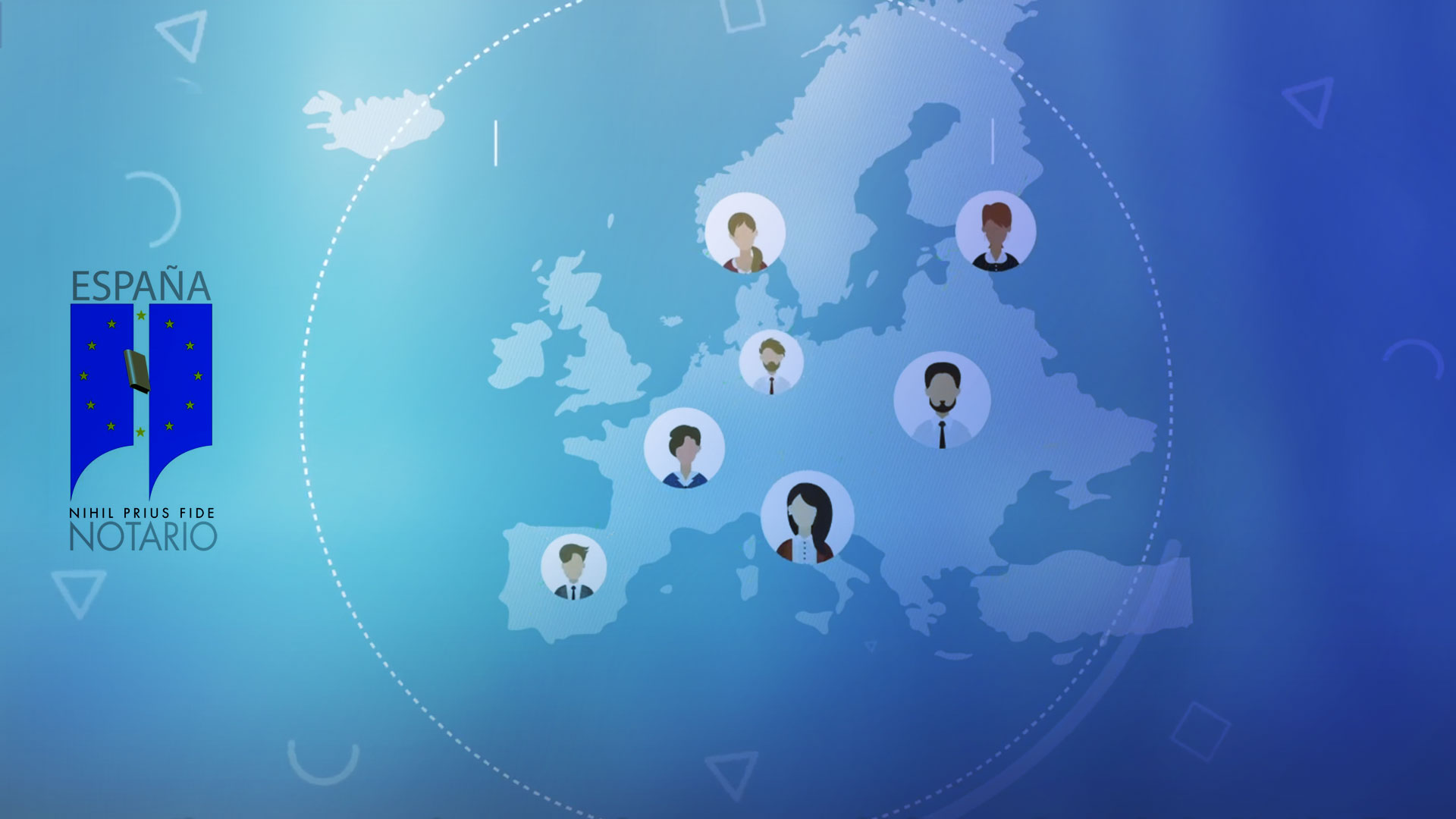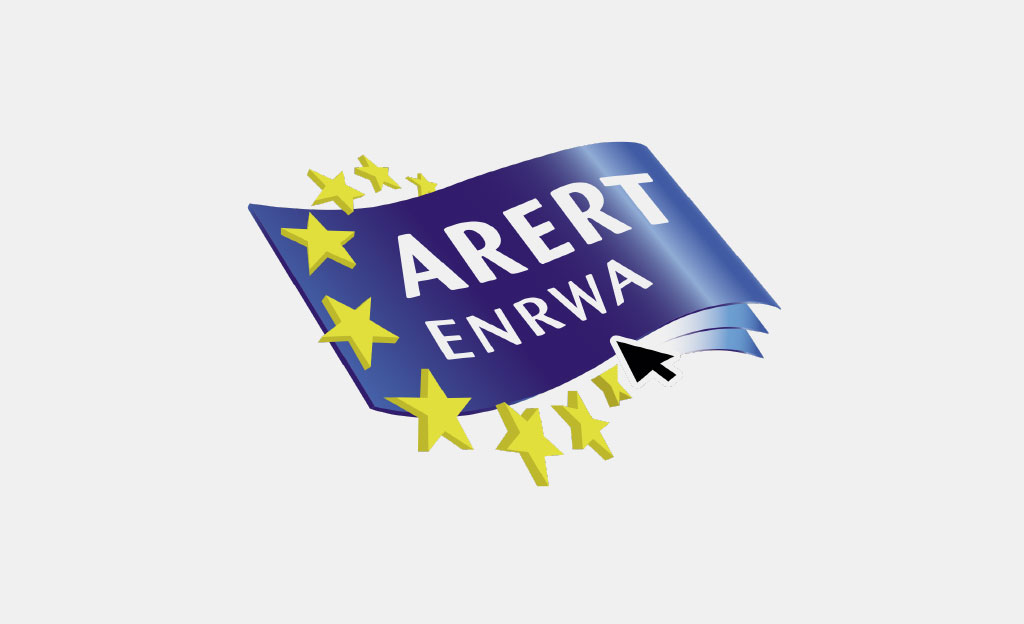_Publications
Launch of “Europe Enacted” Website
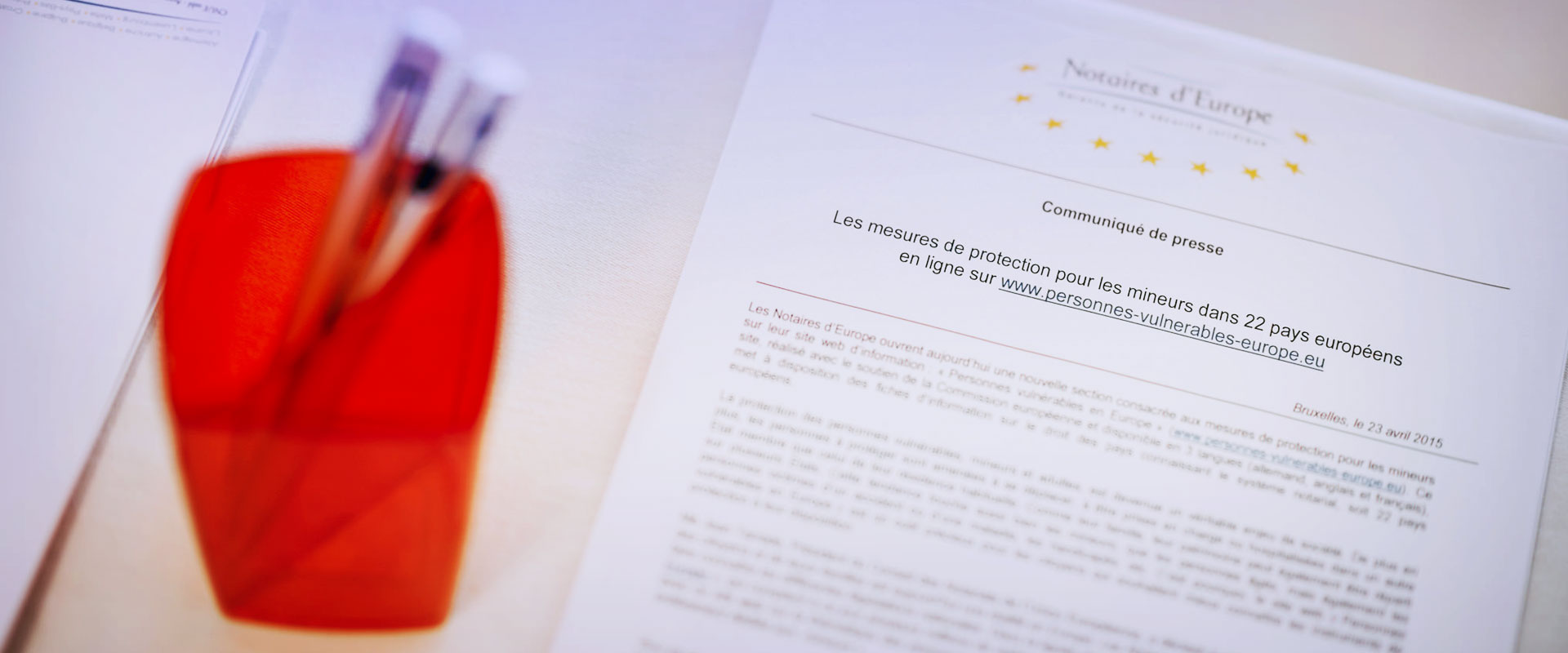
Brussels, 25 October 2019
Launch of “Europe Enacted” Website
–
On the occasion of the European Day of Justice, the Council of the Notariats of the European Union (CNUE) unveils today the content of the travelling exhibition “Europe Enacted” via the website notaries of europe exhibition.
The exhibition highlights notarial acts of great historical value, preserved in the national archives of 17 Member States of the European Union. From a period ranging from the 13th to the 20th century, the fifty or so acts presented reflect the richness of European heritage. Visitors can consult the pages of these acts, as well as detailed explanations in English, French and the language of the country concerned. The “Europe Enacted” exhibition will be at the Brussels headquarters of the European Parliament from 11 to 15 November 2019.
Me Pierre-Luc Vogel, President of the CNUE, states :
What do the will of Queen Isabel la Católica, the award of the “George’s Cross” to the Maltese nation and the renunciation document signed by Archduchess Marie-Antoinette on the crowns belonging to the House of Austria have in common? The notarial act. The “Europe Enacted” underlines that law is an intrinsic part of our European culture and notaries have been a key element of it for several centuries. Notaries are part of our daily lives and are involved, whether or not we are historical figures, in the most important moments of our lives: marriage, buying a property, setting up a business, settling a succession, etc.. The performance of their mission follows cultural, societal, economic and technological developments with electronic authentic instruments, electronic signatures and registers, as well as online services. It is all this past, present and future history that we wish to illustrate through this exhibition.
CNUE in brief
–
The Council of the Notariats of the European Union (CNUE) is an official body representing the notarial profession in dealings with the European institutions. The CNUE includes 22 notarial organisations in the European Union, representing over 45,000 notaries and 200,000 staff.
_Publications
Launch of 4th Edition of Notaries of Europe Open Days

Brussels, 21 October 2019
Launch of 4th Edition of Notaries of Europe Open Days
–
This week opens the 4th edition of the Notaries of Europe Open Days. In 13 European Union countries (Austria, Belgium, Croatia, the Czech Republic, Estonia, Germany, Italy, the Netherlands, Poland, Romania, Slovakia, Slovenia and Spain), events will be held for citizens and students: information sessions, conferences and free consultations at which several thousand people are expected. They will have the opportunity to learn about and ask questions about their family and property situation. The list of events is available on the Council of Europe website
> The list of events is available on the Council of Europe website
Journée européenne de la Justice
Les journées “portes ouvertes“ des Notaires d’Europe s’inscrivent dans le cadre de la Journée européenne de la Justice, une initiative de la Commission européenne et du Conseil de l’Europe qui se déroule tous les ans autour du 25 octobre. Elle a pour objectif de rendre la justice plus proche des citoyens, de les informer sur leurs droits et de promouvoir les travaux du Conseil de l’Europe et de la Commission européenne en matière de justice.
> Visit the Council of Europe website for more information and the list of events
CNUE in brief
–
The Council of the Notariats of the European Union (CNUE) is an official body representing the notarial profession in dealings with the European institutions. The CNUE includes 22 notarial organisations in the European Union, representing over 45,000 notaries and 200,000 staff.
News CNUE, 27 September 2019
German and Spanish notaries ready for online company formation
–
At a joint press conference on Wednesday 18 September, the German and Spanish notariats announced that they are now ready for the creation of online companies in the context of the transposition into national law of Directive 2019/1151.
This directive 2019/1151 on the use of digital tools and processes in company law was adopted in June by the European Parliament and the Council, setting August 2021 as the deadline for transposition into national law.
The President of the General Council of Notaries in Spain, José Ángel Martínez Sanchiz, explained this morning that “German and Spanish notaries have common principles and have worked with the European Commission to prepare this Directive, in the context of the Council of Notariats of the European Union”.
The new directive, which allows the creation of companies entirely through remote digital channels, “relies on the involvement of notaries to guarantee legal security in the process, the identification and verification of the legal capacity of entrepreneurs, impartial advice and the prevention of money laundering, terrorist financing and tax fraud”, said Martínez Sanchiz.
For his part, Jens Bormann, President of the Federal Chamber of German Notaries, referred to “the important role that the European legislator has assigned to notaries in the directive, placing them at the heart of the procedure for incorporating companies online. The aim is to ensure that companies are legally constituted in order to avoid any subsequent disputes. At the same time, the reliable identification of the entrepreneur will make it possible to establish who is behind each company and who represents it, and will be of vital importance for the registration in the commercial register, since the control of the process by a notary gives all the assurances that the information is reliable and legal”, added Mr Bormann.
The online process of setting up a company in Spain
Once the directive is transposed into Spanish law, Martínez Sanchiz explained, any citizen wishing to set up a company entirely online will continue to enjoy the benefits of notarial participation in the process: legal certainty, control of legality, impartial advice and prevention of financial offences.
He also revealed that the General Council of Notaries is already working on the development of the technical means that will allow the public deed of incorporation of a company to be carried out online. This process will include
• Identification of the founding shareholders before the freely chosen notary by means of an electronic national identity document, in accordance with the eIDAS Regulation.
• Confirmation of the real identity of the founding shareholders by the notary by means of the information contained in the electronic national identity document and by videoconference.
• Legal advice offered by the notary to the future entrepreneur in a digital environment, with the content of the public deed agreed.
• Digital confirmation by the notary of the capital contributed to the future company.
• Electronic signature of the notarial deed, with a digital certified copy sent to the entrepreneur.
• Online copy of the deed sent to the commercial register by the notary.
In order to provide more detailed information to all those interested in the issue, the General Council of Notaries has prepared an explanatory video below.
News CNUE, 30 August 2019
A new European grant for the ENRWA
–
On 16 July 2019, the ENRWA obtained co-funding from the European Commission in order to implement the RERT’Improv project, which aims to optimise the interconnection of the registers of wills and SSCs through two actions. The first will consist in increasing the performance of the IT platform, by improving the fineness and quality of the information exchanged. The second aims to increase the network’s visibility by communicating effectively with notaries. This two-year project, in which the Association pour le Développement du Service Notarial en France is a partner, should enable the number of queries to be increased, as well as the number of cases in which a will is found or the certainty of the absence of a will.
Moreover, targeted communication actions will be carried out in cooperation with the Notariats which so wish in order to promote the search for wills and SSCs in foreign registers.
News CNUE, 23 July 2019
FATF highlights the role of the notary system in the fight against money laundering
–
On 8 July 2019, the Financial Action Task Force on Money Laundering (FATF) published its new guidelines for a risk-based approach for legal professionals. The previous edition was published in 2007-2008. “The anti-money laundering system used by Spanish notaries represents a significant step forward for public authorities,” notes the FATF.
“All parties subject to anti-money laundering requirements can consult the beneficial ownership database (Base de Datos de Titular Real, BDTR),” it points out.
The FATF proposes a series of measures for governments to combat money laundering and terrorist financing and to protect the integrity of the international financial system. These measures include a model to be followed by the money laundering prevention system used by notaries in Spain, and specifically its BDTR.
The guide has been sent to the 39 countries that form part of the FATF, including Spain, as well as to member associations such as the European Union.
The Guide states that “The AML system used by Spanish notaries represents a considerable advance for the public authorities who, thanks to its implementation, now have access to a new source of valuable information: the notarial indexes (a single database with information on all public instruments and policies notarised and attested in the country). This information is processed in an integrated and automated way to detect possible money laundering and terrorist financing operations.
On the Beneficial Ownership Database (BDTR), created in 2012 and regulated by Royal Decree 304/2014, the FATF notes that “all parties subject to anti-money laundering obligations can consult the BDTR to facilitate compliance with due diligence obligations. This therefore allows the FIU and law enforcement agencies to obtain information on owners with a percentage of less than 25% (full corporate regime) in Spanish private limited companies, as of a given date.”
The FATF emphasises the two levels of quality of information in the BDTR, with “information verified in accordance with the transaction of sale and purchase of shares of Spanish private limited companies” and “information based on a declaration to a public officer (foreign companies, foundations, associations, Spanish companies)”.
Finally, the FATF states that “the General Council of Notaries has reached agreements with associations of parties subject to AML obligations (banks, savings banks, investment firms, auditors, lawyers, lotteries, credit institutions, etc.)”.
The Beneficial Ownership Database identified the beneficial owners, accredited in 86% of cases, of 2 300 000 legal persons, including companies and associations, foundations and political parties.

News CNUE, 3 June 2019
Workshop with the Dutch notariat on the interconnection of the registers of wills and CSE
–
In cooperation with the Dutch notariat, the ENRWA organised a workshop on 14 May in The Hague. This workshop brought together about twenty Dutch notaries, representatives of the national register and ENRWA administrators, around the theme of the interconnection of registers of wills and SSCs.
The ENRWA President, Mr Philippe Girard, introduced this meeting by recalling the links between the Dutch notariat and the ENRWA: interconnected since 2012, the Dutch register is among the most active on the ENRWA platform. A significant number of wills are also found each year in the Netherlands (39%). Mr Geertjan Sarneel, ENRWA administrator and Dutch notary, stressed the ease of use of the tool. Mr Girard drew the attention of the participants to the responsibility of the notary if he did not query a foreign file when there is a provision in this country. Aart Barkey Wolf, member of the KNB Board, then took the floor to warmly welcome the ENRWA members and the notaries who had come to participate in this workshop.
This meeting made it possible to explain, from a practical point of view, the steps enabling the search for wills from the notary’s office to the receipt of the reply from the foreign register. Fruitful exchanges thus took place between the participants. The practical sheets drawn up by the ENRWA and accessible online on the website www.arert.eu were also presented.
Finally, the interest of setting up a platform allowing the interconnection of CSE registers was underlined, in particular as a tool allowing the search of this new European instrument since its creation by the EU. The Dutch, French and Luxembourg registers are already interconnected in this way.
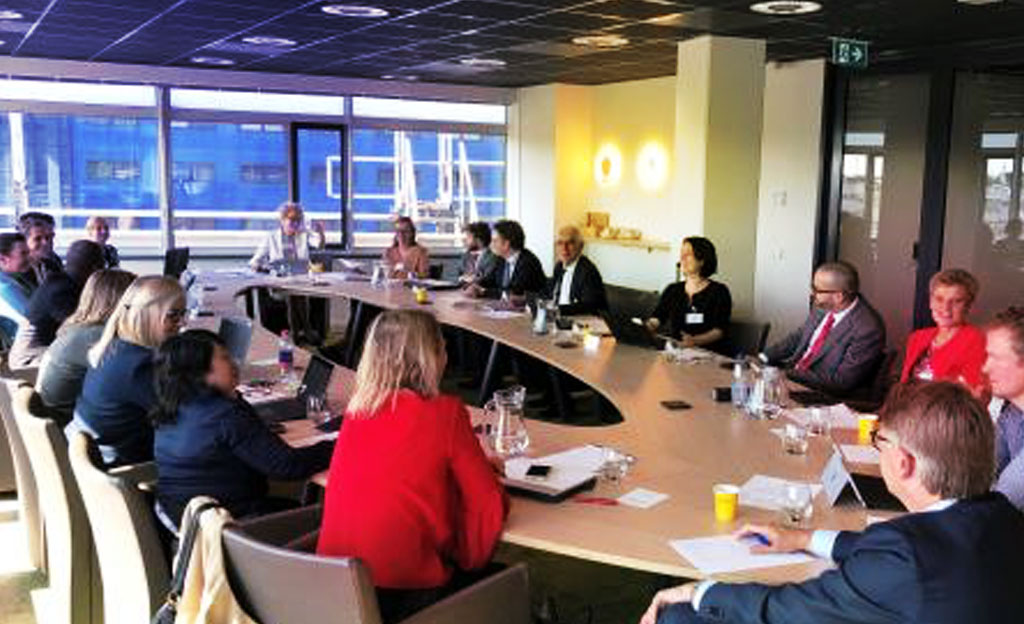
_Publications
The proposals of the Notaires d'Europe for the European elections

Brussels, 2 May 2019
The proposals of the Notaires d’Europe for the European elections
–
In view of the European elections to be held from 23 to 26 May 2019, the Council of the Notariats of the European Union (CNUE) is today unveiling its manifesto for the attention of future MEPs and members of the European Commission. In the context of the increasing internationalisation of family and economic relations, the CNUE intends through this manifesto to make a series of recommendations and proposals to better meet the needs of practitioners and citizens.
Our priorities for the European Union
The European elections come at a turning point for the European Union, which must urgently reconnect with its citizens and represent their interests. With this in mind, the CNUE has identified five main issues within its policy areas for the European Union to address:
1. Promoting the development of non-litigious justice in Europe
2. Facilitate the settlement of successions in Europe
3. Supporting families in Europe
4. Protecting vulnerable people
5. Acting to combat money laundering
Me Pierre-Luc Vogel, Président of the CNUE, states :
Notaries are the legal advisors of citizens and companies. They accompany them through the major stages of life: marriage contracts, the purchase of property, the settlement of an estate, the articles of association of a company, etc. Every month, several million clients pass through the door of a notary’s office. However, we are faced with a constant increase in the number of cases with a cross-border element. With this manifesto, we are working alongside the European institutions to provide legislative and practical solutions to the problems of citizens whose lives now fall within the European area
CNUE in brief
–
The Council of the Notariats of the European Union (CNUE) is an official body representing the notarial profession in dealings with the European institutions. The CNUE includes 22 notarial organisations in the European Union, representing over 45,000 notaries and 200,000 staff.
News CNUE, 2 April 2019
The European Notaries’ Directory gets a makeover
–
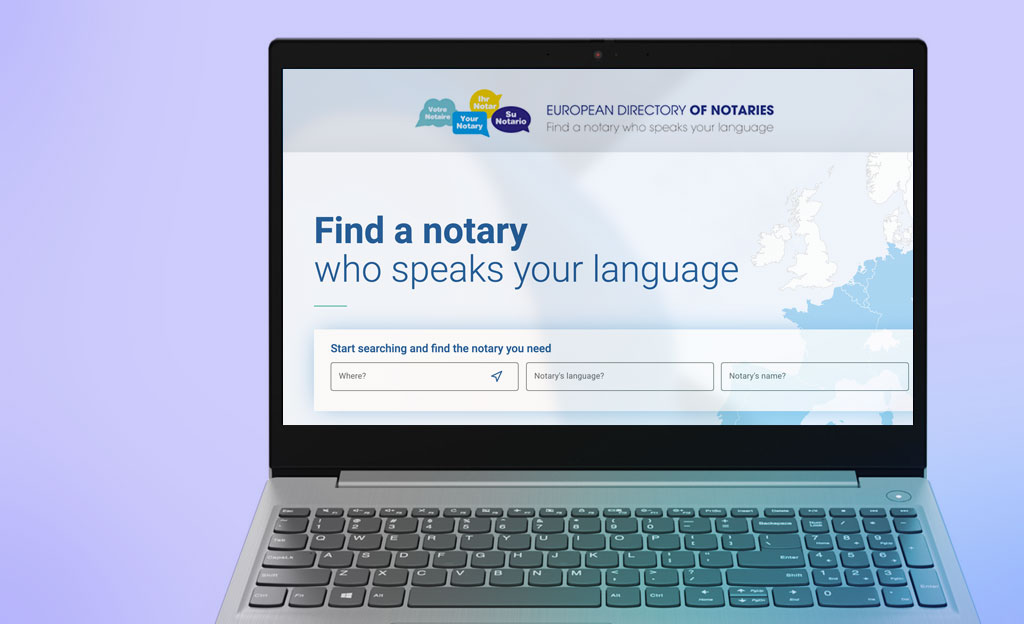
The Council of the Notariats of the European Union unveiled on 2 April the new version of its European Directory of Notaries. Created in 2011 and available in 23 languages, the directory lists some 40,000 notaries in Europe across the 22 EU countries with a notarial system. It provides access to the contact details of notaries and also indicates the languages spoken by the notary. In short, it is the ideal tool for citizens seeking the help of a notary for their international transactions, such as buying a property, settling an estate or setting up a company.
The user-friendly technical infrastructure makes it even easier for the user to find the information he or she is looking for quickly. First, the visitor has to fill in at least one of the following search criteria: location (country, region, city, etc.), language spoken or name of the notary. They can then consult a list of notaries corresponding to their criteria with a geolocation of their offices. Once they have made their choice, visitors have access to the notary’s contact details: postal address, telephone number, e-mail address, website, etc. If they wish, they can request an appointment by filling in a contact form. Thus, thanks to the directory, the citizen will be able, for example, to find a notary in Rome who speaks French and will be able to help him with his procedures on the spot.
Pierre-Luc Vogel, President of CNUE, said:
The European Directory of Notaries is the result of a long-standing partnership with the European Union, which has provided financial support for its production. Just like the European institutions, we strive to develop tools to facilitate the cross-border procedures of citizens. The European Directory of Notaries is a concrete demonstration of this commitment.
_Publications
European directory of notaries revamped

Brussels, 2 April 2019
European directory of notaries revamped
–
The Council of the Notariats of the European Union today unveiled the new version of its European Directory of Notaries. Created in 2011 and available in 23 languages, the Directory lists the approximately 40,000 notaries of Europe across the 22 countries of the European Union that are familiar with the notarial system. It gives access to the notaries’ contact details and also lists the languages spoken. The ideal tool for citizens seeking a notary’s help for their international transactions, such as buying a property, settling a succession or setting up a company.
The technical infrastructure is very easy to use, making it even easier and faster for users to find the information they are looking for. First, visitors to the website must complete at least one of the following search criteria: the place (country, region, city, etc.), the language spoken or the name of the notary. They can then consult a list of notaries corresponding to their criteria with a geolocation of their offices. Once users have made their choice, they have access to the notary’s contact details (postal address, telephone, email, website, etc.). If they wish, they can request an appointment by filling out a contact form. Thus
Me Pierre-Luc Vogel, president of the CNUE, said :
The European Directory of Notaries is the result of a long-standing partnership with the European Union, which has provided financial support for its creation. Like the European institutions, we are working to develop tools to facilitate citizens’ cross-border procedures. The European Directory of Notaries is the tangible demonstration of this commitment
Please enjoy exploring > see the new website
CNUE in brief
–
The Council of the Notariats of the European Union (CNUE) is an official body representing the notarial profession in dealings with the European institutions. The CNUE includes 22 notarial organisations in the European Union, representing over 45,000 notaries and 200,000 staff.
_Publications
Notaries of Europe join european parliament’s “This Time I’m Voting” campaign

Brussels, 29 March 2019
Notaries of Europe join european parliament’s “This Time I’m Voting” campaign
–
At its General Assembly, the Council of the Notariats of the European Union (CNUE) today decided to join the European Parliament’s “This time I’m voting” campaign. This pan-European and non-political campaign aims to encourage as many people as possible to vote in the next European elections, which will take place from 23 to 26 May 2019.
Me Pierre-Luc Vogel, president du CNUE, said :
In the context of the social, economic and political challenges facing the European Union, it is our duty to raise awareness of the importance of the European elections. We must ensure that the abstentionist party is not the main European party
Signing of a Memorandum of Understanding with the European Parliament
This CNUE support was formalised with the signature of a Memorandum of Understanding with the European Parliament, under which the CNUE undertakes to promote the campaign among notaries and citizens. The CNUE’s mission will be to highlight the importance and relevance of the European elections and to encourage notaries and citizens to vote in May in an informed way. It will do so through a series of coordinated initiatives at EU level, implemented by its national members.
The platform “Thie time I’m voting“
This platform was launched by the European Parliament in 24 languages. It supports more than 150,000 volunteers in all Member States who have registered and committed to convincing citizens to vote. These volunteers bring people together, discuss issues that concern them and the future of Europe. Parliament’s liaison offices in all Member States act as information centres adapted to local needs. They support public debate by offering local platforms, easy-to-access online tools, seminars and information materials.
> Visite the website “This time I’m voting“
Support the campaign by registering on the European Parliament’s website :
> On social media with the hashtag #thistimeimvoting
CNUE in brief
–
The Council of the Notariats of the European Union (CNUE) is an official body representing the notarial profession in dealings with the European institutions. The CNUE includes 22 notarial organisations in the European Union, representing over 45,000 notaries and 200,000 staff.
_Publications
Application of European regulations on matrimonial property regimes and registered partnerships

Brussels, 29 January 2019
Notaries of Europe welcome application of European regulations on matrimonial property regimes and registered partnerships
–
European Regulations 2016/1103 on matrimonial property regimes and 2016/1104 on the property consequences of registered partnerships are now applicable as part of an enhanced cooperation procedure currently involving 18 Member States: Austria, Belgium, Bulgaria, Croatia, Cyprus, Czech Republic, Finland, France, Germany, Greece, Italy, Luxembourg, Malta, Netherlands, Portugal, Slovenia, Spain and Sweden.
Thanks to these two Regulations, the conflict of laws rules are now unified between the Member States participating in the enhanced cooperation to determine the applicable law and the competent court which will decide on the division of assets in the event of, inter alia, separation of the couple or death. For example, for a Franco-German couple living in Brussels, the provisions of the regulations will allow them to choose between the law of their habitual residence (Belgian law) or that of their nationality (French or German law), thus providing them with more predictability and therefore legal certainty.
Me Pierre-Luc Vogel, president du Conseil des Notariats de l’Union Européenne (CNUE), said :
The application of these two regulations is excellent news for European citizens who have close links with several Member States, for family or professional reasons. It is also a challenge for which the notaries of Europe are ready. We now call on other Member States to join the enhanced cooperation procedure
Raising awareness among practitioners and the general public: a priority for the CNUE
–
In partnership with the European Union, the CNUE has invested in the training of several thousand European notaries.
Via the platform of the European Notarial Network, practical tools are also available to notaries in order to simplify the processing of their cross-border cases: a network of national interlocutors, legal databases, bilingual forms, a videoconferencing system, etc. In preparation for the implementation, explanatory handbooks on both regulations are available in several languages and for ten days at the following link > Discover
The EUFides platform EUFides aims to facilitate online collaboration between European notaries. EUFides is a notarial cloud in which two notaries of different nationalities can exchange documents on the same file in a totally secure way. Seven notariats participate in this platform: the Belgian, Dutch, French, German, Italian, Luxembourg and Spanish notariats. Originally designed for the processing of cross-border real estate transactions, EUFides has been extended to other areas of notarial expertise: inheritance law, company law, etc.
Finally, for the general public, the “Couples in Europe” website “Couples in Europe“ provides citizens with information on the law of the Member States in the language of their choice. Launched at the end of 2012 with the European Commission’s support, it has now been visited nearly 1 million times, demonstrating that citizens have a significant need to be informed about their legal situation.
CNUE in brief
–
The Council of the Notariats of the European Union (CNUE) is an official body representing the notarial profession in dealings with the European institutions. Speaking for the profession, it expresses the joint decisions of its members to the institutions of the European Union. The CNUE includes 22 notarial organisations in the European Union, representing over 40,000 notaries and 200,000 staff. The European notariats are represented in the CNUE by the presidents of the national notariats. The CNUE operates under the authority of a President, the CNUE’s spokesperson, who has tenure for one year.

